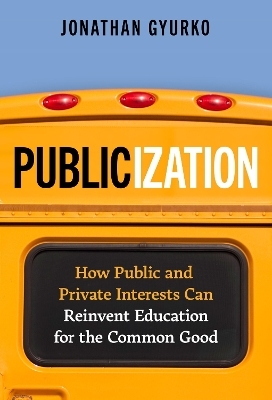
Publicization
Teachers' College Press (Verlag)
978-0-8077-6942-3 (ISBN)
- Lieferbar (Termin unbekannt)
- Versandkostenfrei innerhalb Deutschlands
- Auch auf Rechnung
- Verfügbarkeit in der Filiale vor Ort prüfen
- Artikel merken
How public are America’s public schools? They may be tax funded and free, but the effects of market-based policies, exclusionary governance, insufficient funding, and structural inequities impair schools’ ability to prepare future citizens, workers, neighbors, and stewards of the planet. Gyurko offers a fresh look at the “publicness” of American education through historical accounts, scholarly research, first-hand reporting, and political analyses. Chapters on funding, governance, standards, accountability, and equity show what must be done to better identify and strengthen the shared aims of public schools. Novel insights explain how even controversial topics like charter schools, testing, teacher tenure, and unions can be part of a broad “Publicization Project.” Champions of public education will find a compelling vision and achievable roadmap that moves the country beyond decades of privatization. Publicization is an essential introduction to major debates of past years with a hopeful vision of what it means to be an educated American.
Book Features:
Speaks directly to political controversies affecting education including school choice, book banning, the “reading wars,” board elections, critical race theory, and teacher unions.
Offers first-hand, never-before-reported accounts of high-profile efforts involving prominent political players including AFT president Randi Weingarten, former U.S. education secretary Arne Duncan, former NYC mayors Michael R. Bloomberg and Bill de Blasio and schools chancellor Joel I. Klein, Success Academy CEO Eva Moskowitz, former PBS correspondent John Merrow, KIPP cofounder David Levin, late philanthropist Eli Broad, small schools founder Deborah Meier, and historian and activist Diane Ravitch.
Provides pragmatic recommendations that cross political divides,including a fresh look at charter schools, the role of unions and collective bargaining, parent involvement in school decision-making, standardized testing, and equity-advancing reforms.
Gathers the history of education ideas, thinkers, and past reforms to provide new generations of educators with a cogent summary of what has come before to inform what comes next.
Jonathan Gyurko is a nationally recognized education leader. He was an official at the NYC Department of Education and the United Federation of Teachers, and he served on the board of Dream Charter Schools. Gyurko was the inaugural Harber Fellow in Educational Innovation at Wesleyan University and is president and cofounder of the Association of College and University Educators.
Contents
Acknowledgments xi
Introduction 1
Privatization’s Antidote: Publicization 3
The Public Good 4
Criteria of a “Public” Education 5
A Political Project 6
What Makes a School “Public”? Some Personal Perspectives 9
A Primer, a Memoir, and a Playbook 11
The Exclusion Test 13
Part I: Criteria
1. Funding 19
Private Interests Remain Entrenched 21
The Strengths and Limits of Judicial Remedies 23
A Question of Fairness 28
2. Facts and Beliefs 29
School Choice, Private Beliefs, and the Risk to Public Goods 30
The State’s Disreputable History in “Making” Americans 31
The Risk of “Working It Out at the Polls” 33
Facts as a Measure of a School’s Publicness 34
3. Governance 37
A Framework for Democratic Education 38
Getting Politics Out of Education 41
Private Interests Fill the Void 42
“Exit” Is Not “Voice” 45
Putting Politics Back Into Education 46
Rules of the Road 48
Following the Rules of the Democratic “Game,” Over and Over 49
Trust Over Time Versus Winner-Takes-All 51
Pressure Politics: How Do We Know? 54
4. Standards and Testing 57
A Nation at Risk and the Rise of Standards 57
Taxes Versus Accountability 59
Economics Invades Education 61
A Reformer’s Connecticut Adventure 64
The Wrong Lesson to Draw From a Modest Victory 66
5. Accountability 67
The Profession’s Obligations 69
Preprofessional Accountability 73
The Polity’s Responsibilities 75
Employment Accountability 76
School-Based Commitments 79
Student Performance 83
How Will You Know, John? 86
6. Equity 87
Defining Equity 88
Structural Inequity From “The Cult of Efficiency”: The Industrial Paradigm of Schooling 89
A Brief History of Progressive Alternatives to the Industrial Paradigm 93
The Industrial Paradigm Rewrapped: The “Cult of Innovation” 94
For Consideration: An Intellectual-Emotional Paradigm 94
Intellectual Capacities 95
Emotional Capacities 97
The Intrinsic Equity of an Intellectual-Emotional Paradigm 100
A Political, Not an Educational, Problem 101
Part II: Cases
7. Charter Schools 107
The Publicness of Charter School Funding 108
The Publicness of Charter School Curriculum 110
The Charter School “Compact” and Its Complicity in the Industrial Paradigm 112
Competition and the Conservative Agenda 114
Charter Schools and the Teacher Unions 115
Making Charter Schools More Public 117
“Invisible” Versus “Helping” Hands: Community-Based Charter Schools 118
Charter Schools and the Progressive Agenda 121
Finding Common Ground in the Common Good 131
8. Teacher Unions 132
Education Portfolios and Competition at the Apex of Education Policy 132
Out-Reforming the Reformers: The United Federation of Teachers 134
The Creative Entanglements of Union-Run Charter Schools 138
A Mixed Result 140
A Crash Course in Labor History, Politics, and Practice 141
Mission Accomplished? The Role of Teacher Unions in Making Schools More Public 142
Next-Stage Teacher Unionism 157
9. Conclusion 161
What If It Comes Out “Wrong”? 163
Making a Movement 165
Endnotes 167
Index 201
About the Author 212
| Erscheinungsdatum | 29.02.2024 |
|---|---|
| Verlagsort | New York |
| Sprache | englisch |
| Maße | 156 x 229 mm |
| Gewicht | 318 g |
| Themenwelt | Sozialwissenschaften ► Pädagogik ► Allgemeines / Lexika |
| Sozialwissenschaften ► Pädagogik ► Bildungstheorie | |
| ISBN-10 | 0-8077-6942-8 / 0807769428 |
| ISBN-13 | 978-0-8077-6942-3 / 9780807769423 |
| Zustand | Neuware |
| Haben Sie eine Frage zum Produkt? |
aus dem Bereich


